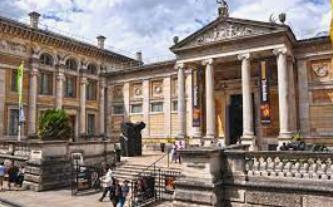
4 minute read
Trip Review to Regent’s Park Open Air Theatre by
Madeline Casco Year 13
On Tuesday the 20th of September, Classics, Drama and English Literature students of St Margaret’s headed to Regents Park Open Air theatre to watch a production of the Ancient Greecian tragedy, Antigone!
After school we all set off on various routes to make our way to Regents Park where we were met by the teachers who joined us for the occasion. Whilst some of us already had knowledge of the plays' themes and characters the rest of us were novices to the drama and so the atmosphere was a mixture of excitement and anticipation
The play began with all of the characters bursting onto the stage dancing and laughing which immediately captured the audience inviting them into the drama As it was from a modern perspective, Antigone’s family portrayed a British Pakistani Muslim family who discussed the unjust laws and fought over righteous rebellion after the death of Polyneices and Eteocles, Antigone’s two brothers. In the original play Eteocles and Polyneices engage in battle fighting for the throne after their father, Oedipus goes into exile, and during the battle both of them die However what struck our attention most was that one brother (Eteocles) was branded as a victim of terrorism whilst the other (Polyneices) was labelled a terrorist. What's worse was the mens own uncle, Creon, who was Britain's first Muslim prime minister, aimed to ensure anti-terrorism laws that superseded international codes of conduct This meant that Polyneices was wrongfully refused a burial which was true to the Sophoclean original but also adapted to Islamic beliefs surrounding the deceased. Therefore the tragedy centred around actress Zainab Hasan who took on the main protagonist's role in fighting for her brother's justice
The play included many topical issues such as discussions on the corrupt views of governmental decisions against Muslim rights in Britain and also touched upon mixing faiths and culture and the conflict this produces Due to Angitone’s struggles against Creon, her uncle, who heavily opposed the idea of burying Polyneices, themes of female empowerment arose as she took matters into her own hands, by burying her brother herself, for which she suffered the consequences. Inevitably she was incarcerated however in the ideals of the modern world she became a prominent figure in the media speaking out on the injustice Muslims in Britain face daily as she argued over a system of politics and symbols of identity To aid her case in fighting her uncle she utilised Quranic Arabic to show Islam to be a delicate faith which should have its laws recognised out of respect for the dead. As with every Greek tragedy there was no happy ending as Antigone hung herself and her fiance, Haimon, was stabbed by Creon
Overall the play generated a torrent of emotions for the audience, from upbeat dances to intense captivating conversations as well as incredible visuals produced by constantly using the expanse of the stage and even lighting pink flares to create a feminine mood during a protest in an atmospheric way Having spoken to other members of the sixth form who described the play as “breathtaking” and “enthralling” we all appreciated the importance of the play's message due to its relevance in modern British society
Trip review by Lili Tsintis-Oviedo Year 11

On the 7th November, the year ten to thirteen Latin and Classical Civilization students visited Oxford for the day Before visiting the Ashmolean museum, we had a quick tour around Exeter college. In my opinion, their dining hall was absolutely breathtaking and I am yet to decide whether I loved it because of the beautiful architecture and historical meaning of the building, or because it just reminded me of the Great Hall in Hogwarts. Nonetheless, I was truly in awe at the splendour of the room. After this quick stop to admire the college, we walked to the Ashmolean museum. Personally, this was my favourite part of the day as I’ve always had a special interest in historical museums. I like to think of them as a sort of time machine that transports someone back to the past. It is especially incredible to think that the Romans or Ancient Greeks would have used simple things like jewellery, coins and vases on a day to day basis, yet here we stand looking at them through glass over 2,000 years later Our worksheets enabled us to search the entire museum, wondering at the marvellous artefacts. One of my favourite parts of the museum was definitely the cast gallery and the sculpture of Laocoon and his sons. We were encouraged to think deeper about how the sculptor carved fear into the people’s expressions which creates a tense atmosphere in this block of stone. The idea of someone being able to retell a highly emotional story with a knife and a slab of stone will forever remain a wonder to me. As well as the statues, we saw many different exhibits that related to our GCSE courses as well. For example, we saw the tombstone of a Retiarius in the Roman Gallery. It was fascinating to see the carving and gain a deeper understanding of the gladiator’s family from it, but also amazing to see the remains of the ancient world that we have learnt about in the classroom displayed before our eyes.
After we dispersed for lunch, we walked up to St Hilda’s college where we were fortunate enough to be lectured by a professor A point of hers that stuck out to me was when she discussed Virgil’s Aeneid. Currently I’m studying a different section to the one she was talking about, however it was still interesting to hear some of the other parts and gain another perspective. Her lecture gave us all an insight into the ancient civilisations, in particular Augustus’ reign and society’s beliefs about the Gods, which instilled a deeper knowledge about their society and how traces of it may even be seen in modern society After the lecture, three of the St Hilda’s college students gave us a tour around the college grounds whilst we asked them questions about the university Unfortunately, I was too engrossed by the scenery so I didn’t ask any questions, but I heard from my fellow classmates that they offered a keen insight into the college as well as being overall enjoyable to talk to.
In general, the trip to Oxford was extremely enjoyable. As a person who is fascinated by all aspects of history, the atmosphere in Oxford was incredible. It had a sort of elegance about it, yet it was still cosy and autumnal. The historical architecture was very impressive and seeing all the small shops along the street created an unmatched sense of community I am extremely eager to return to Oxford and see all the things we were unfortunately unable to visit.



